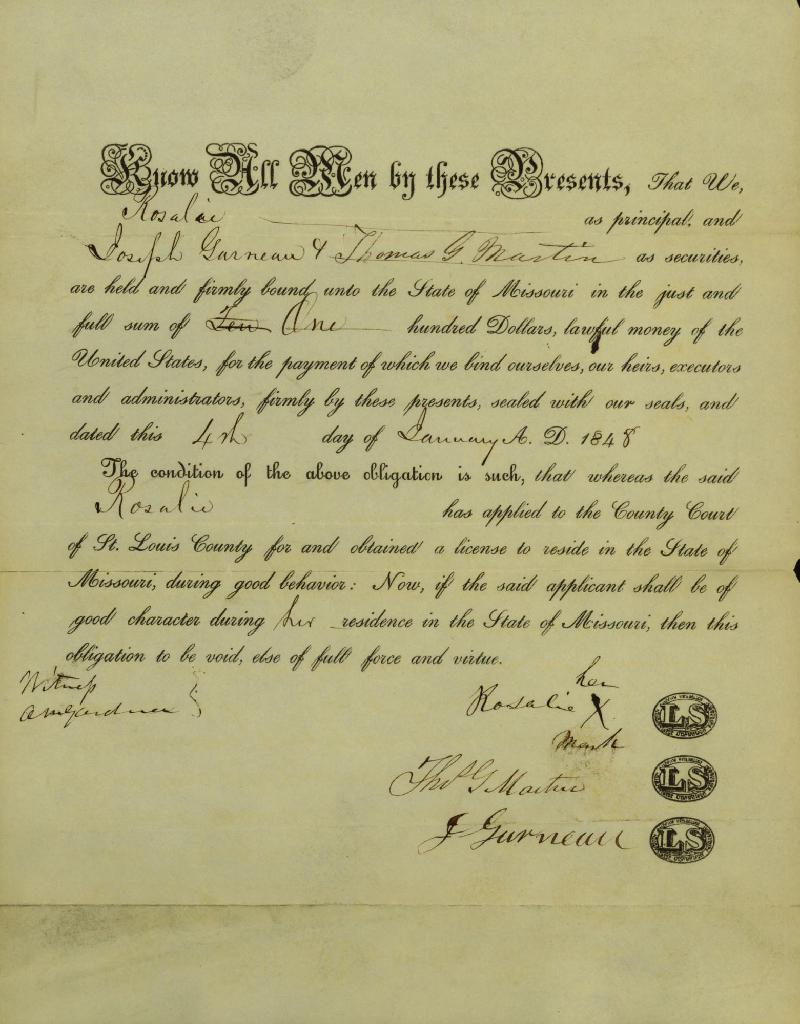Document Text |
Summary |
| Know all men by these presents, that we Rosalie as principal, and Joseph Garneau and Thomas G. Martin as securities, are held and firmly bound unto the State of Missouri in the just and full sum of 100 dollars, lawful money of the United States, for the payment of which we bind ourselves, our heirs, executors and administrators, firmly by these presents, sealed with our seals, and dated this 4th day of January A.D. 1848. | All readers should know that Rosalie and her securities, Joseph Garneau and Thomas G. Martin, do sign this pledge to pay the state of Missouri $100. We sign this agreement on January 4, 1848. |
| The condition of the above obligation is such, that whereas the said Rosalie has applied to the County Court of St. Louis County for and obtained a license to reside in the State of Missouri, during good behavior: Now if the said applicant shall be of good character during her residence in the State of Missouri, then this obligation to be void, else of full force and virtue. | Rosalie applied for a license to live as a free woman in the State of Missouri. She will be allowed to do so as long as she exhibits good behavior. If the court decides she had shown bad behavior, she and her securities will have to pay this $100 fine. |
| Rosalie X (her mark) Thomas G. Martin J. Garneau Witness: [illegible] |
Free Negro Bond for Rosalie, transcription, County Court of St. Louis, January 4, 1848. Missouri Historical Society, D07255.
Background
As a result of the Missouri Compromise, Missouri entered the Union as a slave state in 1821. Missouri legislators feared that free Black people from the free states that bordered Missouri would move to the state and encourage the enslaved people there to revolt. In 1835, the legislators passed a new law that required that every free Black person in the state to apply for a freedom license. This allowed the all-white government to determine which free Black people could reside in the state.
In 1843, the Missouri legislature added a second condition to the law. It said that all free Black people had to sign a bond guaranteeing their good behavior. If the free Black person then did something that the state deemed illegal, they would lose their freedom license, be forced to leave the state, and have to pay a fine. The fines could be as high as $1,000, which is equivalent to over $30,000 today. The person also had to find at least one person willing to sign the bond as their security. If the free Black person could not pay their fine, their security would have to pay it for them. If a free person or their security could not pay, the government could seize their property and sell it. It was challenging to find someone willing to take that kind of financial risk. This additional requirement made it even harder for free Black people to live in Missouri.
About the Document
This is the Missouri freedom bond of a free Black woman identified only as Rosalie. In the bond, she and her securities, Joseph Garneau and Thomas G. Martin, each promise to pay $100 if Rosalie is ever found guilty of bad behavior in the state. Her total bond would be worth about $10,000 today.
Vocabulary
- bond: A contract in which a person offers to pay money if another person does something wrong.
- free state: A state where slavery was outlawed.
- legislator: A person who makes laws.
- Missouri Compromise: Legislation passed in 1820 that admitted Missouri to statehood as a slave state and Maine as a free state in order to maintain the balance of power in Congress. It also outlawed slavery in the remaining Louisiana Purchase territory north of Missouri’s southern border. Repealed in 1854 by the Kansas-Nebraska Act.
- security: A person that signs an agreement like a bond in support of another person.
- slave state: A state where slavery was legal.
Discussion Questions
- Why was the Missouri legislature anxious to control the free Black population of their state? What does this fear reveal about the state of slavery in the antebellum period?
- What conditions did Rosalie need to fulfill in order to live in Missouri? How did these conditions limit the free Black population?
- What does this bond reveal about the status of free Black people in the United States in the antebellum period?
Suggested Activities
- APUSH Connection: 5.5 Sectional Conflict: Regional Differences
- Use this document to extend your students’ understanding of the issues of slavery and freedom in Missouri after the Missouri Compromise of 1820.
- Pair this resource with the Elizabeth Jennings case and the life story of Letitia Carson for a larger lesson about the challenges of being a free Black person in the antebellum United States.
- Missouri would eventually host the most famous manumission court case in American history. Read the life story of Harriet Robinson Scott to learn more.
- Today, bail reform advocates argue that the system of criminal bonds in the United States unfairly penalizes Americans of color. Ask students to research this issue and connect it to the history of freedom bonds in the antebellum period.
- Rosalie was able to establish herself as a prosperous free Black woman, despite tremendous obstacles. For more examples of free Black women succeeding against difficult odds, see: Incidents in the Life of a Slave Girl, Salem Female Anti-Slavery Society, Fighting Segregation, Life Story: Sojourner Truth, Life Story: Letitia Carson, and Life Story: Elizabeth Keckley.
Themes
AMERICAN IDENTITY AND CITIZENSHIP







